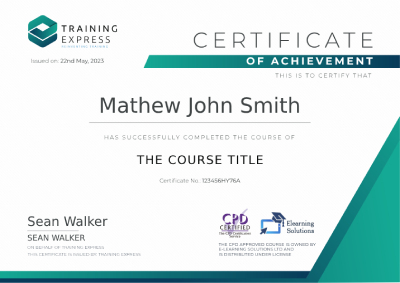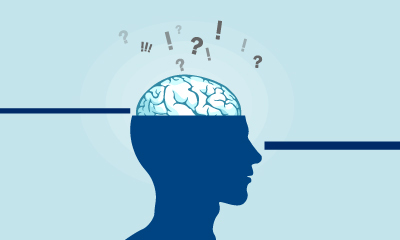GET THIS COURSE AND 1500+ OTHERS FOR ONLY £49 PER YEAR. FIND OUT MORE
16 others bought this course in the last 24 hours!
Educational Psychology & Development course teaches you everything on the topic thoroughly from scratch so you can achieve a professional certificate for free to showcase your achievement in professional life. This Educational Psychology & Development course is a comprehensive, instructor-guided course, designed to provide a detailed understanding of the nature of the related sector and your key roles within it.
To become successful in your profession, you must have a specific set of skills to succeed in today’s competitive world. In this in-depth training course, you will develop the most in-demand skills to kickstart your career, as well as upgrade your existing knowledge & skills. The training materials of this course are available online for you to learn at your own pace and fast-track your career with ease.
Please note that this course does not entitle you to join the HCPC register or recognised as educational psychologist. Through this course you will come across all the basic guidelines of educational psychology to boost and shine your knowledge in this particular field of Educational Psychology and it will add your CPD points.
Key Features of the Educational Psychology & Development Course
Our trusted, high quality and affordable Educational Psychology & Development course trains individuals to become experts in their field.
- Accredited by CPD
- Instant e-certificate and hard copy dispatch by next working day
- Fully online, interactive course with audio voiceover
- Developed by qualified professionals in the field
- Discounts on bulk purchases
- Self-paced learning and laptop, tablet, smartphone-friendly
- 24/7 Learning Assistance
Sneak Peek
Who should take the course
Anyone with a knack for learning new skills can take this Educational Psychology & Development course. While this comprehensive training is popular for preparing people for job opportunities in the relevant fields, it also helps to advance your career for promotions.
Certification
Once you’ve successfully completed your Educational Psychology & Development course, you will immediately be sent a digital certificate. Also, you can have your printed certificate delivered by post (shipping cost £3.99). Our certifications have no expiry dates, although we do recommend that you renew them every 12 months.

Accreditation
All of our courses, including this Educational Psychology & Development course, are fully accredited, providing you with up-to-date skills and knowledge and helping you to become more competent and effective in your chosen field.
Assessment
At the end of the course, there will be an online assessment, which you will need to pass to complete the course. Answers are marked instantly and automatically, allowing you to know straight away whether you have passed. If you haven’t, there’s no limit on the number of times you can take the final exam. All this is included in the one-time fee you paid for the course itself.
Course Curriculum
The detailed curriculum outline of our Educational Psychology & Development course is as follows:
- What is Child Psychology?
- The Environmental Context and Child Development
- The Scope of Child Development
- Stages of Development
- Areas of Development
- Interrelationship among Various Areas of Development
- Importance of the Study of Child Development
- Stages of Psychosocial Development
- Summary
- Assessment
- Types of Development Recap
- Influences on Problematic Development
- Parenting Styles
- Exposure to Family Problems in Early Life
- Summary
- An Overview of Cognitive Development
- Piaget’s Theory
- The Information-Processing Theory
- Cognitive Milestones Age-By-Age
- Cognitive Development in Infancy
- Cognitive Development in the Toddler/Preschool Years
- Cognitive Development in the Middle Years
- Cognitive Development in Adolescence
- Summary
- General Stages of Social Development
- Attachment and Bonding
- Stages of Emotional Development
- Outside Factors Affecting Social Development
- Family Factors that Affect Social Development
- Nature vs Nurture
- Children’s’ Fears
- Overcoming Social Fears in Children
- Dealing with Social Phobias
- Understanding Emotional Development in Children
- Age Guidelines
- General Principles for Supporting Children’s Emotional Development
- Summary
- Brain Development
- Intellectual Development at Different Ages
- Personality/Character Development
- Psychoanalysis
- Customisation of Psychoanalytic Concept
- Erikson and Sullivan’s Stages of Psychosocial Growth
- The Role Socialisation vs Temperament
- Role of Parent’s motivation
- Temperament/Personality Traits
- Types of Personalities Types of Children
- Parent’s Temperament and Personality Development
- Reasons and Results of Childhood Trauma
- Summary
- Introduction to Language Development
- Phonological Development
- Lexical Development
- Morpho-Syntactic Development
- Learning and Communication Difficulties
- Factor Influencing Language Development
- Linguistic Processes
- Evolution of Communication Bilingual Children
- Parent’s Role in Helping Children
- Development of Skills at Different Stages
- Summary
- Introduction
- Moral Development
- Stages of Moral Growth in Children
- Piaget on Moral Development
- Lawrence Kohlberg’s Theory of Moral Development
- Other Theories of Moral Development in Children
- Freud’s Theory of Psychosexual Development
- Summary
- Assisting Learning and Teaching in the Classroom
- Developing Professional Skills and Knowledge
- Empowering TAs to Support the Learning Process
- Practical Support for the Colleagues
- Leadership and Management for a TA
- Mandatory Professional Practice
- Teamwork
- Dress Code
- Equal Opportunities
- Health and Safety
- Child Protection
- Lone Working
- First Aid
- Summary
- Assessment
- The Whole-School Learning Environment
- Safe Learning Environment
- First Aid Skills
- Support the Maintenance of Pupil Safety and Security
- The Child Care Environment
- Child Care Environment
- Safeguard the Well-Being of Children and Young People
- Further Medical Conditions for Emergency
- Asthma
- Cardiac Issues
- Coeliac
- Diabetes
- Epilepsy
- Blind Issues
- Stroke Association
- The Anaphylaxis
- Young Epilepsy
- Summary
- Some Different Theoretical Perspectives
- The ABCs of Behaviour
- Factors which influence behaviour
- What is acceptable behaviour?
- Antecedents – What Happens To Trigger Behaviour?
- Consequences – Good and Bad
- Behaviour Around The School: What’s Your School Policy?
- The Beneficial Effects of Positive Relationships
- How Does Good Teaching Affect Behaviour?
- The ABCs of Adult Behaviour
- Helping Pupils Take Responsibility for Their Own Behavior
- Bad behaviour: How bad does it have to be?
- Better behaviour: Being realistic about change
- Best behaviour: Keeping pupils motivated
- Summary
- Assessment
- Emotional and Behavioural Difficulties – A Definition
- Behaviour as Communication
- Enhancing Communication Using Neuro-Linguistic Programming (NLP) In the Classroom
- Communication with Parents and Carers
- Discipline Strategies
- De-Escalating Difficult Situations
- Communicating Assertively Not Aggressively
- Individual Strategies in the Learning Environment
- Conversation for Change for Older Children
- Professional Supervision in Schools
- Work Discussion Groups, the Group Mind and Supervision
- Helping Schools Develop New Ways of Working
- Benefits of Multidisciplinary Working
- Summary
- Assessment
- Counselling and Guidance Services
- School Social Work services for Secondary Schools
- Life Planning Education
- Career Guidance for Secondary Schools
- Summary
- Review Questions
- What is the role of School Staff in Safeguarding Children
- How to Interact with and Respond to Children
- How to Interact with and Respond to Adults
- Ways of Communicating with Children and Adults
- Summary
- Review Questions
- Child Care Legislation
- Eligibility
- Flexibility
- Quality
- Summary
- Review Questions
- Student Suicide Cases
- Drug Taking and Trafficking
- Problems Related to Sexuality
- Pornographic Materials Issue
- Gambling and Gang Activities
- Bullying Issues
- Suspected Students Illegal Behaviours
- Summary
- Review Questions
- Children and families at the centre: the policy context
- Pupil relationships and Importance
- Family relationships and Importance
- Meeting the SEND Code of Practice guidance
- An awareness of potential barriers
- Pupil relationships: whole-school approaches
- Pupil relationships: individual approaches
- Family relationships: whole-school approaches
- Family relationships: individual approaches
- Specific circumstances: Education, Health and Care plans
- Summary
- Assessment
- Definitions
- Recognition
- Signs of Neglect
- Helping Children to Protect Themselves
- Summary/Keynotes of the Module
- Assessment
- Statutory Services
- Health Services for Children
- Social Services for Children
- Education Services for Children
- Leisure Activity and Recreation Services
- Voluntary Services and Self-help Agencies
- Summary/Keynotes of the Module
- Assessment
- What are Special Needs?
- What is Disability?
- Avoiding Stereotypes
- Use of Appropriate and Sensitive Terminology
- Special Education Needs
- Early Support Programme
- Caring for Children with Feeding and Communication Differences
- Caring for Children with Mobility Differences
- Caring for Children with Special Social and Emotional Needs
- Caring for Children with Complex Needs
- Summary/Keynotes of the Module
- Assessment
- How Phonics Is Taught?
- Characteristics of Strong Phonics Instruction
- Phonics Lesson
- Blending: Teaching Children How Words Work
- Popular Techniques for Developing High-Frequency and Decodable Word Knowledge
- Teaching Methods for Those with Dyslexia
- Summary
- Assessment
- EYFS and Every Child Matters
- Provider Responsibilities
- Progression Through the Areas of Learning and Development
- Suitable Premises, Environment and Equipment
- Organisation
- Partnership Working
- Summary
- Assessment
- The Different Teaching Techniques
- Direct Teaching
- Indirect Teaching
- The Importance of Creating an Enabling Environment
- How to Keep Children Motivated
- Summary
- Assessment
Course Curriculum
 TAKE THIS COURSE
TAKE THIS COURSE
£199.00£30.00 ex VAT- 1 year
- Intermediate
- Course Certificate
- 8 hours, 35 minutes Gift this course
Subscribe to this course and 2,000+ top‑rated Training Express courses for your organization.
Try Training Express Business- For teams of 5 or more users
- 2,000+ fresh & in-demand courses
- Learning Engagement tools
- SSO and LMS Integrations
 Food Hygiene
Food Hygiene Health & Safety
Health & Safety Safeguarding
Safeguarding First Aid
First Aid Business Skills
Business Skills Personal Development
Personal Development









